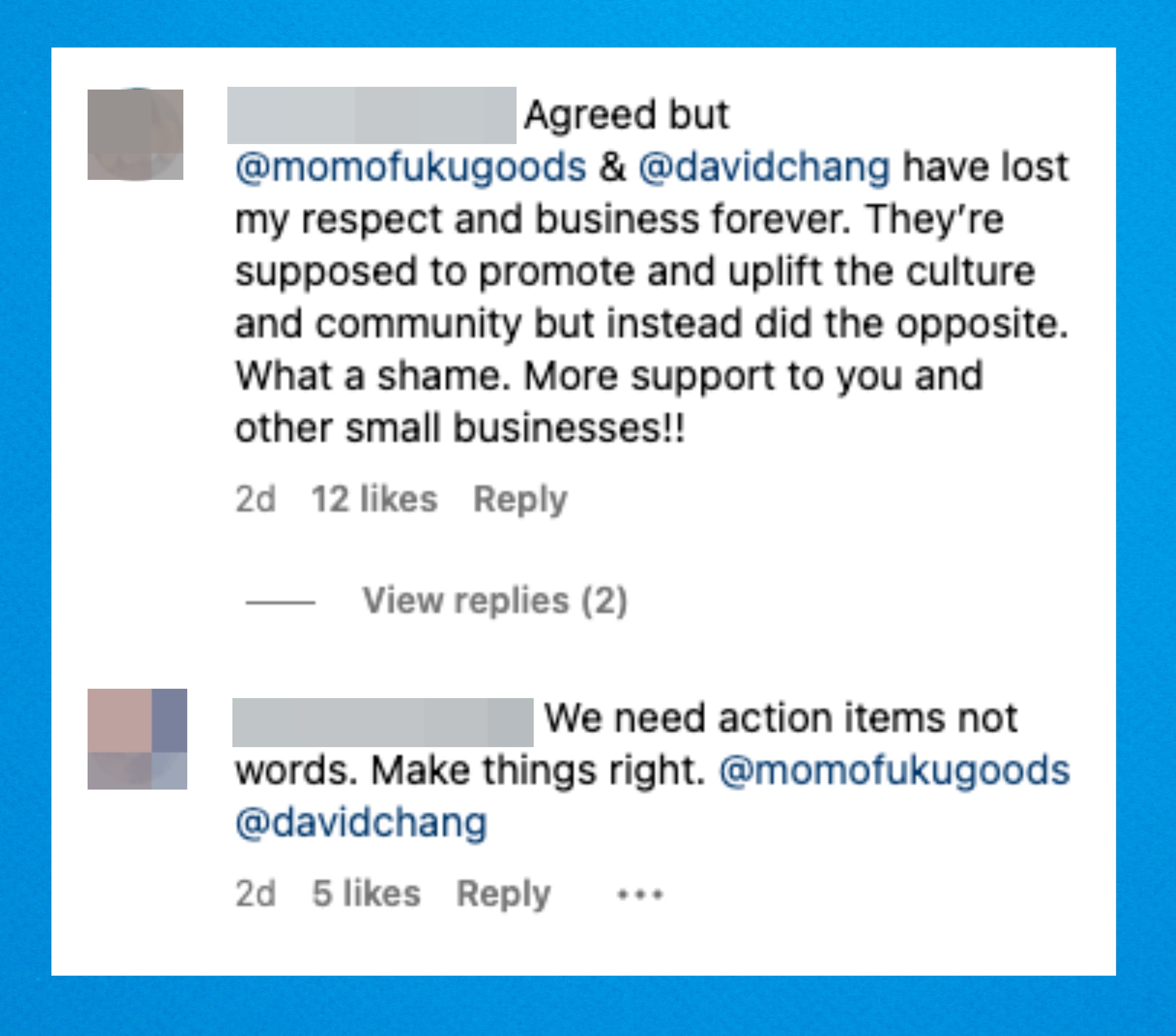Last week, celebrity chef David Chang and his company Momofuku were at the center of a very viral (and very heated) PR dispute when it was reported that the brand sent cease-and-desist letters to several AAPI-owned condiment brands.
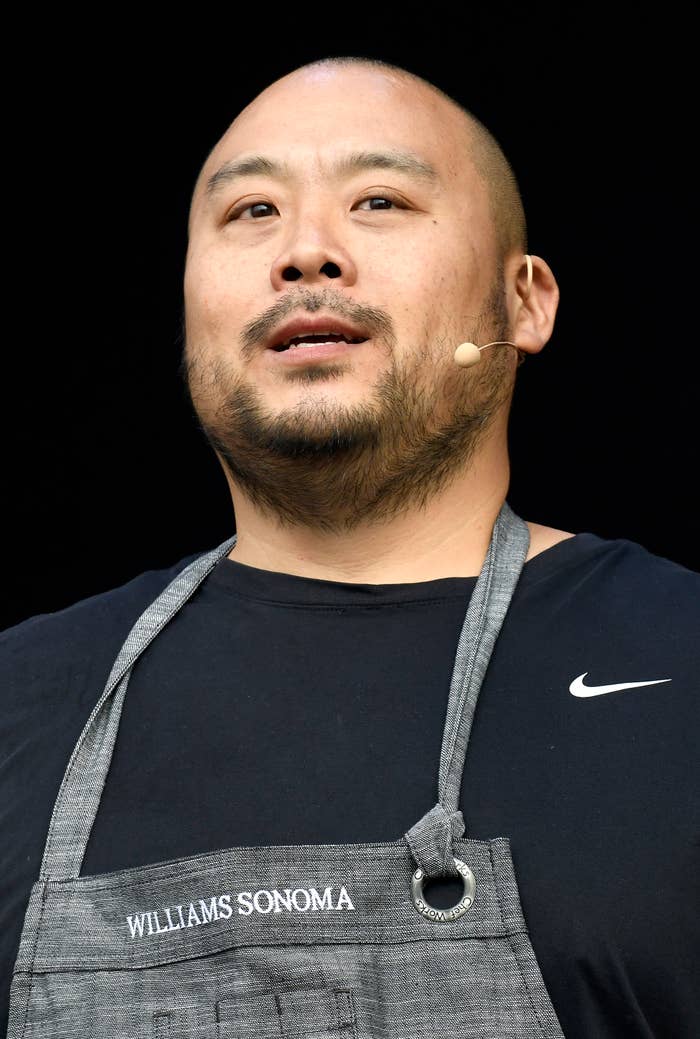
The controversial move marked the beginning of Momofuku's attempt to trademark "chili crunch," a spicy and savory chili oil-based condiment that's become increasingly popular in the United States in recent years. Although the condiment is closely tied to chili crisp (which has origins in China), many brands, including Chang's, opt for the chili crunch verbiage on product packaging — including Homiah and MìLà, two of the brands on the receiving end of these cease-and-desist orders.
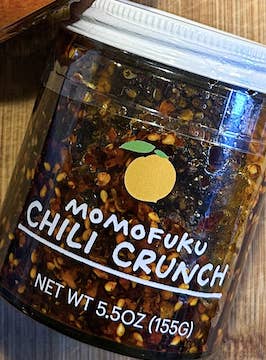
Here's the quickest recap if you're not up to speed on last week's events: After the trademark war went viral, it didn't take long for backlash to set in. Across social media, commenters called out Chang and Momofuku for "bullying" other condiment brands (several of which were one- or two-person operations) into ceasing the use of "chili crunch" to describe their products.
Chang was called everything from a "trademark bully" to a "culinary colonizer" and was even accused of attempting to "whitewash" the condiment aisle. As evidenced by social media comments, many consumers called for a boycott of Momofuku Goods products, and several small Asian markets and stores pledged to no longer purchase goods from the brand as a direct result of the company's decision.
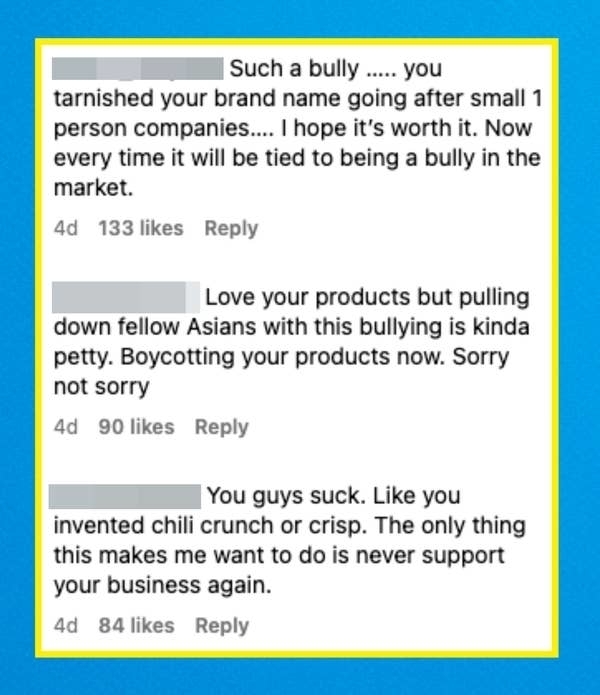
For the full scoop on what happened, you can read our post on the situation from last week — but no matter which way you slice it, Momofuku's aspirational trademark endeavor landed the company in a major PR crisis.
On Friday, Chang's very popular podcast The Dave Chang Show released a special 20-minute episode in which Chang was joined by the company's CEO, Marguerite Zabar Mariscal, to discuss the whole chili crunch debacle.
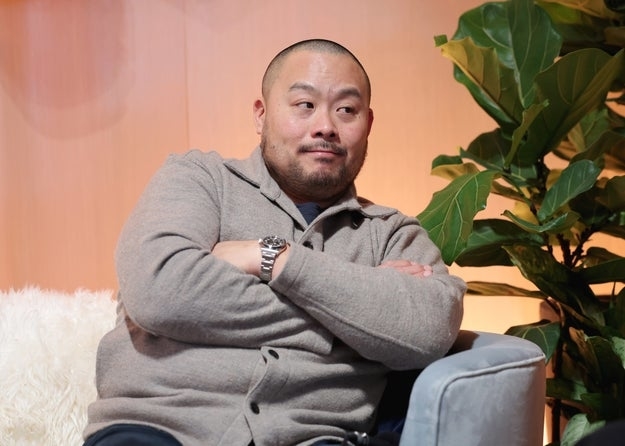
It opens with Chang admitting that the episode is "not your normal podcast" and will instead "address the debate that's been playing out over the past few days over social media."
Most of the apology is handled in the first few minutes. Chang explains that when Momofuku first put their chili crunch product on the market in 2020, they intentionally chose crunch to avoid overlap with chili crisps. "What we're learning this week, and in a painful way learning, is that the terms crunch and crisp are essentially the same thing in Mandarin," he says. "In holding the term crunch as a trademark, Momofuku can be seen as trying to own a piece of Chinese culture and heritage, which is exactly the opposite of what we wanted to achieve."
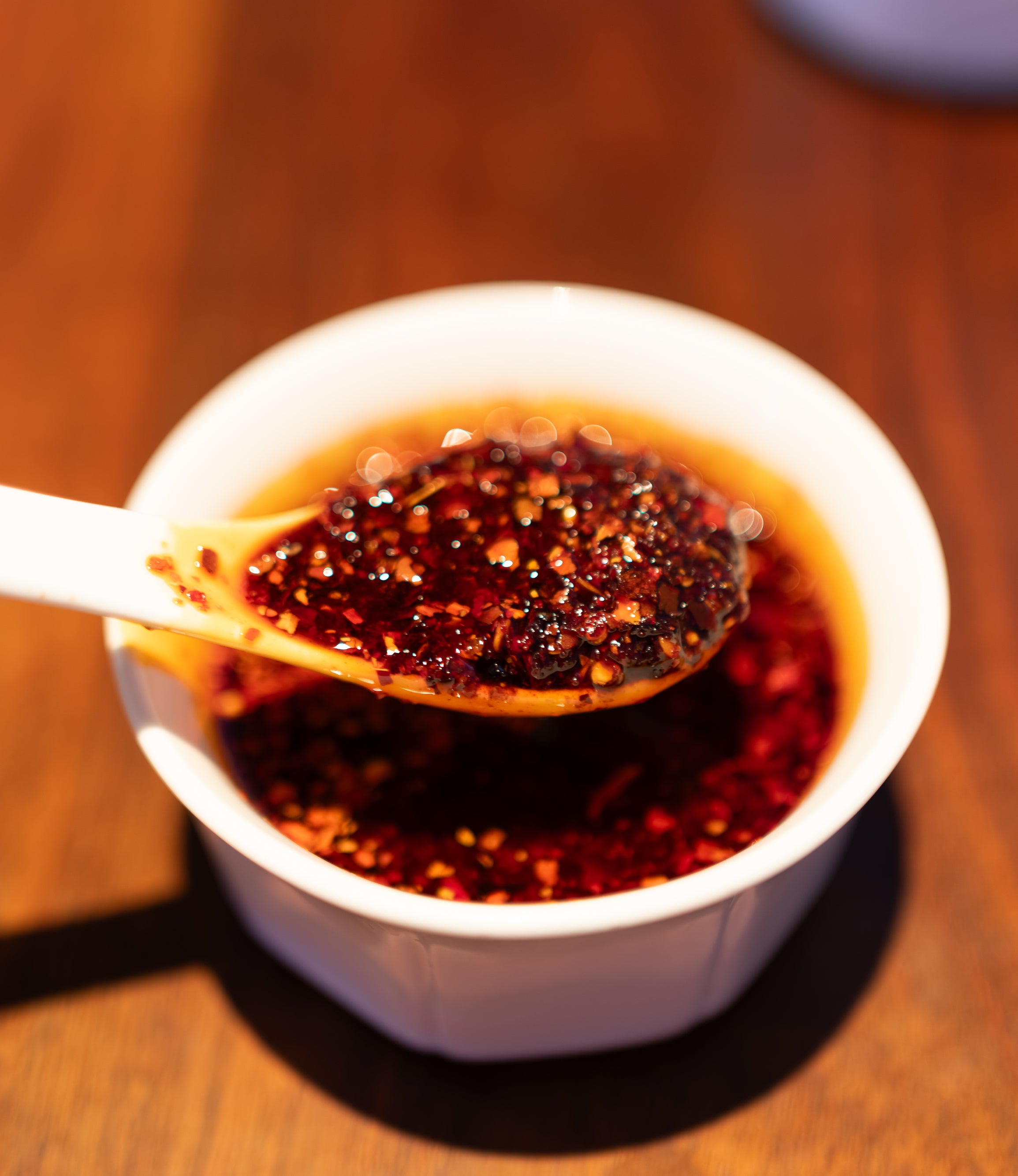
He states that he wants to accomplish three things: "I want to apologize to everyone in the AAPI community who's been hurt or feels like I've marginalized them...that's the last thing, literally the last thing I wanted to happen," he says. He also mentions his desire to go through the "timeline of how we got here in 2024" and commits to explaining how the company will rectify the situation moving forward.
These are the main points that Chang and Mariscal hit over the course of those 20 minutes.
And remember: Momofuku doesn't yet own the "chili crunch" trademark, as they only filed their application with the USPTO in March of this year. They do, however, own the "chile crunch" (with an "e") mark as a result of a 2023 legal settlement with the company Chile Colonial — which becomes necessary context a little later on.
1. As previously mentioned, Momofuku's decision to call their product chili crunch was because their product wouldn't be "authentically Chinese" like Lao Gan Ma's, the first (and still one of the most popular) purveyors of chili crisp in the US. Instead, Chang wanted to create a new chili sauce by combining chili crisp with other known chili sauces, like salsa macha, salsa seca, and Momofuku's Ssäm sauce. He says that they landed on "crunch" because he "likes alliteration" — and the sauce itself was "crunchy."
"Had I known that chili crunch was a tautology, basically the same as chili crisp, we would've never named it chili crunch. I would've come up with something else," he explains.
2. Mariscal claims that the cease-and-desists sent out over the "past year" were to both small companies and companies "larger than Momofuku" — seemingly speaking to the swirling narrative that they cherry-picked small brands without the financial means to enter a complicated legal battle. Later in the episode, Chang admits that the other companies pulling in more revenue and doing bigger business than Momofuku "sorta pissed [him] off."
3. Chang says that his instinct was to "get rid of the [trademark]" when he learned of the backlash last week, hoping to deem the term "generic" instead. In other words, ensuring that no company could ever trademark the term. But he then claims that genericizing "chile crunch" would be impossible with current trademark law — and that doing so would just put the term up for grabs for a company larger than them (he explicitly references Trader Joe's) to trademark and take ownership of.
4. According to both Chang and Mariscal, they're investigating options for moving forward, but they've decided they'll be "doing nothing" with their trademark. "We're not going to enforce the trademark, we're not going to police the trademark, and by doing so, it's possible it becomes a generic term and nobody can own it," Chang adds.
Mariscal states that the risk of another larger company coming along and taking the mark from them as a result of Momofuku not defending the mark is "a risk [they're] willing to take."
However, it still isn't clear if they have formal plans to withdraw their current USPTO application for the "chili crunch" mark.
5. Last but very much not least: After Momofuku's chili crunch first launched, they actually received a cease-and-desist from Chile Colonial, a small company that started selling a Mexican-inspired "chile crunch" (with an "e") in 2008. CEO Marguerite Mariscal explains that instead of changing Momofuku's chili crunch to another name, they "worked with [the business owner] to actually purchase the mark so [they] could continue using the chili crunch name that [they'd] come up with back in 2020." In turn, they gave Chile Colonial a "perpetual license" to continue to use their newly transferred chile crunch mark.
We got in touch with Chile Colonial owner Susie Hojel, who confirmed this information in a statement to BuzzFeed. Hojel also touched on the Trader Joe's of it all, claiming that she sent a cease-and-desist to the company in 2020, which caused them to change their popular "chili onion crunch" to "crunchy chili onion." In turn, this gave Chile Colonial the incontestable right to the trademark, which led Momofuku to purchase the "chile crunch" trademark from Hojel for an undisclosed amount.
Hojel told BuzzFeed that "Momofuku now owns the trademark, and in [her] opinion, has the right to protect it."
Outside of the podcast, the Trader Joe's element has become surprisingly central to the dispute in the past few days. Recent Instagram comments from Homiah, one of the initial brands to be sent a cease-and-desist from Momofuku, seemingly contradict Chang's narrative that the grocery chain could swoop in to nab a "chile" or "chili crunch" trademark should either become available. In a comment to an Instagram user, Homiah alleges that Trader Joe’s actually opposed the "chile crunch" trademark back in 2020 "on the grounds of genericism." (In other words, when they were initially hit with a cease-and-desist from Chile Colonial, they thought the term was too generic for anyone to trademark in the first place.)
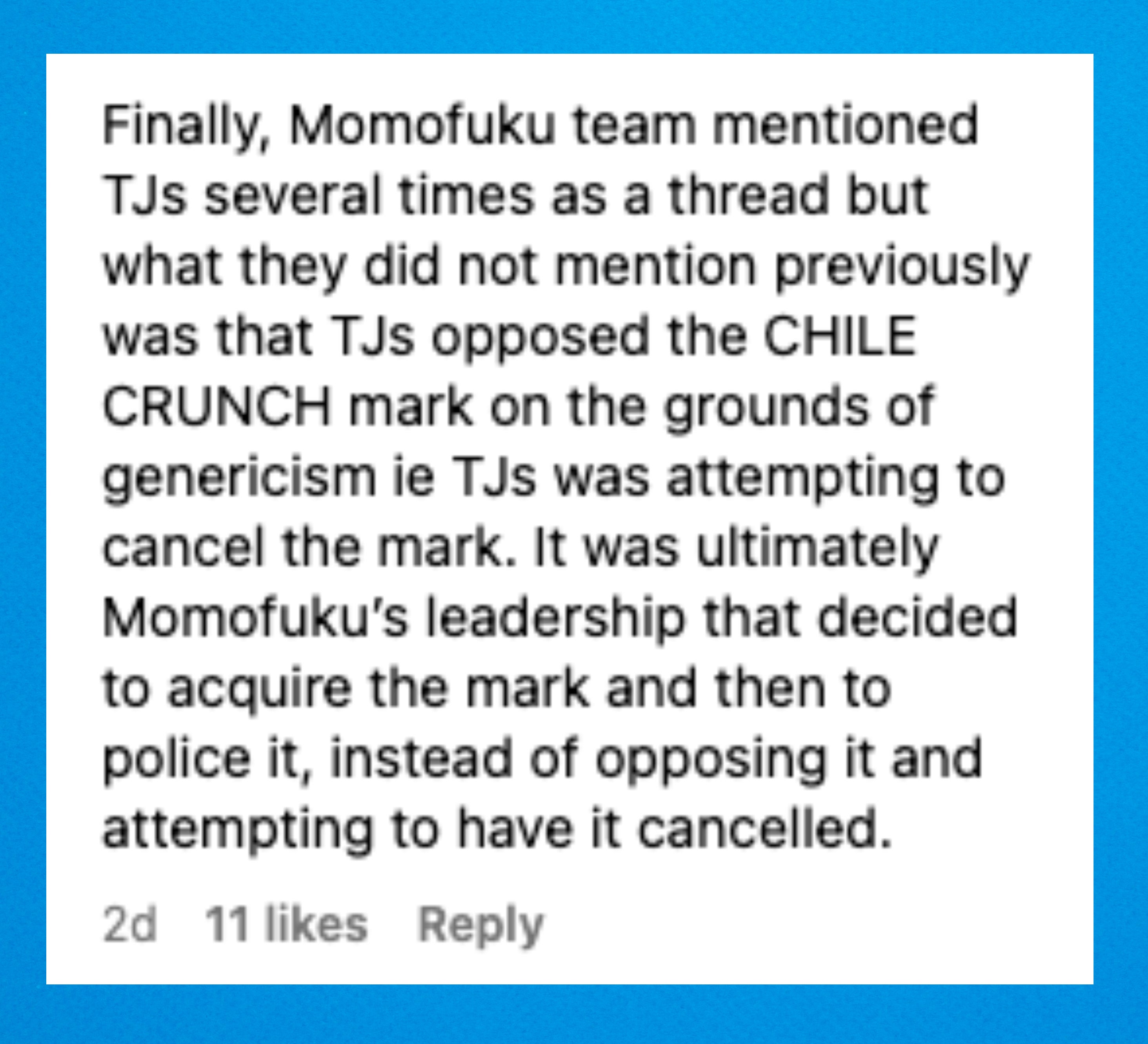
The comment is just one element of a larger statement that Homiah posted on Instagram in the wake of Chang’s podcast episode, and it presents an entirely different understanding of the trademarking process as a whole. "I disagree with Momofuku's position that it needs to continue to own these marks," they said, claiming that if Momofuku officially retired their trademarks, "nobody [could] claim exclusive rights to these terms, even if others try to register them as trademarks."
"It's very unlikely that a new trademark for a descriptive trademark like this can go through currently, hence the reason Momofuku was likely eager to acquire the trademark from Chile Colonial that was approved a decade ago when USPTO was more lax," they said in a comment. "In fact, a majority of IP lawyers think it seems quite likely the chili crunch trademark that Momofuku applied for on March 29 will be refused by USPTO on the ground of descriptiveness."
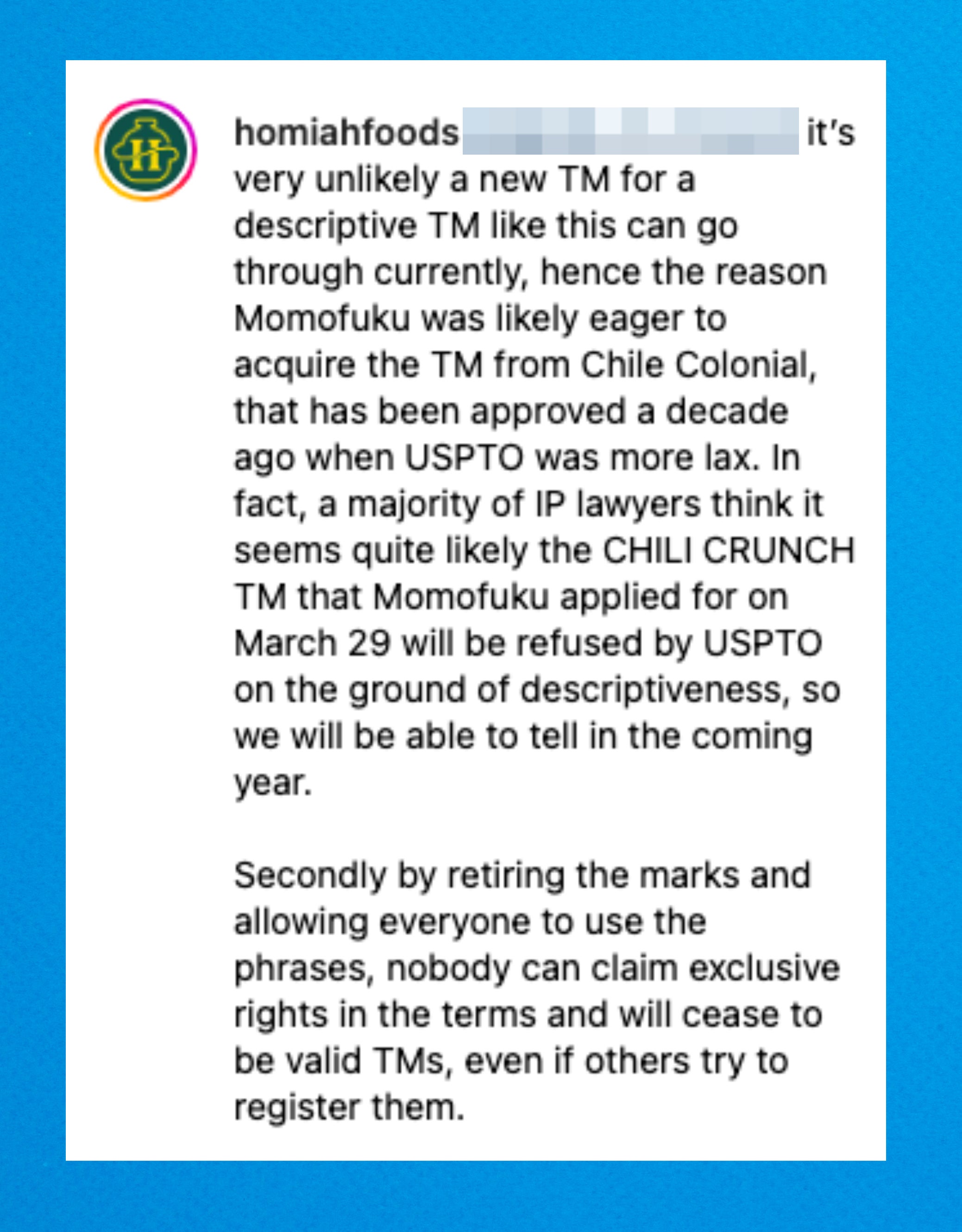
This discrepancy between Homiah and Momofuku speaks to just how subjective the world of trademarks and intellectual property is. An interview Bon Appétit conducted with IP lawyer Hamutal Lieberman last week touched on many of the subjectivities at play with this trademark application, from the "e" vs. "i" argument to why the chili crisp brand Fly By Jing lost out on a similar application for "Sichuan chili crisp" in 2019. As a result, it's evident that no two lawyers and no two individuals at the USPTO office have identical perspectives. Trademark law is notoriously complicated — which makes disputes such as this one difficult to objectively weigh in on from the outside.
As of now, the podcast appears to be the only format that David Chang and Momofuku's public apology has taken. Momofuku hasn't yet posted a formal apology on its socials, and comments on any new Instagram posts from Chang still appear to be turned off. Either way, over on X (aka Twitter), the podcast-focused damage control appears to have quelled some of the backlash, with several users commending Chang and Momofuku's decision to back down on defending the trademark. It's a palpable shift from sentiments before the podcast episode aired, which leaned incredibly critical of Chang and Momofuku's decision to trademark.
But in comments on Homiah's Instagram statement, several people expressed that the apology was too little too late and that they'd already done irreparable damage to their own brand. Some called for "action items, not words," seemingly nodding to Momofuku's "do nothing" approach to enforcing their current trademark.
